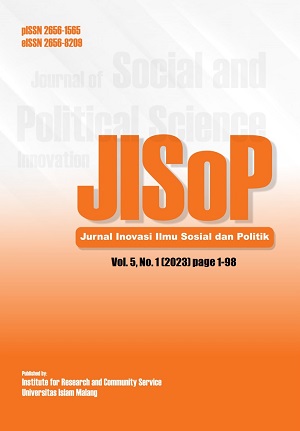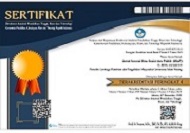Re-defining stunting in Indonesia 2022: A comprehensive review
DOI:
https://doi.org/10.33474/jisop.v5i1.19741Keywords:
stunting, toddler, growth, health, nutritionAbstract
Stunting is a condition of failure to thrive in toddlers due to chronic malnutrition, especially in the first 1000 days of pregnancy, in rural families, there is no term-stunting even mothers with toddlers stunting have different meanings to the condition of toddlers stunting this is motivated by the meaning obtained from the stock of knowledge.Stunting itself is divided into 2 namely short toddlers(stunted) namely short and very short toddlers(severely stunted) namely toddlers with body length (PB/U) or height (TB/U) based on age with a comparison of WHO-MGRS standards (Multicentre Growth Reference Study) 2006. In this study uses the type or research literature approach to analys and described stunting in Indonesia. Conditions of stunting measured by height or body length that is minus two standard deviations of the median standard of toddler growth from WHO. The focus of this study is to look at the meaning of mothers with toddlers stunting and the actions of mothers with toddlers stunting. According to data from the Ministry of Health of the Republic of Indonesia, approximately 9 million toddlers experience it stunting with a prevalence of 37% in 2013. To the Ministry of Health's Basic Health Research in 2018, one of the factors for the high stunting seen directly is the low intake of nutrition and health. Decline stunting is considered important, therefore a multi-sectoral approach is planned through the synchronization of national, local, and community programs at the central and regional levels.
References
Ariadi, S. (2011). Buku ajar mata kuliah: Sosiologi Kesehatan, Departemen Sosiologi. Universitas Airlangga.
Arsyad, G., Silfia, N. N., & Faina. (2021). Pemberian Makanan Pendamping Air Susu Ibu (MPASI): Tinjauan Melalui Emotional Demonstration, Pengetahuan dan Sikap Ibu. Adab.
Beluska-Turkan, K., Korczak, R., Hartell, B., Moskal, K., Maukonen, J., Alexander, D. E., Salem, N., Harkness, L., Ayad, W., & Szaro, J. (2019). Nutritional gaps and supplementation in the first 1000 days. Nutrients, 11(12), 2891. https://doi.org/10.3390/nu11122891
Budiastutik, I., & Nugraheni, S. A. (2018). Determinants of stunting in Indonesia: A review article. International Journal Of Healtcare Research, 1(2), 43–49. http://journal2.uad.ac.id/index.php/ijhr/article/view/753
Darmalaksana, W. (2020). Metode penelitian kualitatif studi pustaka dan studi lapangan (Vol. 5). Pre-Print Digital Library UIN Sunan Gunung Djati.
De Onis, M., & Branca, F. (2016). Childhood stunting: a global perspective. Maternal & Child Nutrition, 12(1), 12–26. https://doi.org/10.1111/mcn.12231
Hall, C., Bennett, C., Crookston, B., Dearden, K., Hasan, M., Linehan, M., & West, J. (2018). Maternal knowledge of stunting in rural Indonesia. International Journal of Child Health and Nutrition, 7(4), 139–145. https://doi.org/10.6000/1929-4247.2018.07.04.2
Iqbal, M., & Yusran, R. (2021). Upaya Konvergensi Kebijakan Pencegahan Stunting Di Kota Padang. Jurnal Manajemen Dan Ilmu Administrasi Publik (JMIAP), 3(2), 109–116. https://doi.org/10.24036/jmiap.v3i2.245
Khadijah, M. A., & Amelia, N. (2020). Perkembangan fisik motorik anak usia dini: teori dan praktik. Prenada media.
Laksono, A. D., & Megatsari, H. (2020). Determinan Balita Stunting di Jawa Timur: Analisis Data Pemantauan Status Gizi 2017. Amerta Nutrition, 4(2), 109–115. https://doi.org/10.20473/amnt.v4i2.2020.109-115
Mandarana, M., Hafid, F., Pangestika, W., Kusuma, T. U., Sulistiani, R. P., Puspitasari, D. A., Widyastuti, R. A., Kusumawati, D. E., & Sada, M. (2022). Ilmu Gizi Dasar. Pradina Pustaka.
Nurfita, N. R. (2021). Literature Review Faktor-faktor yang Berhubungan dengan kejadian Stunting Balita Tahun 2020. Midwife’s Research, 10(2). https://journal.stikesmuhcrb.ac.id/index.php/MIDWIFE/article/view/244
Oktaviani, N. P. W., Lusiana, S. A., Sinaga, T. R., Simanjuntak, R. R., Louis, S. L., Andriani, R., Putri, N. R., Mirania, A. N., Rokhmah, L. N., & Kusumawati, I. (2022). Siaga Stunting di Indonesia. Yayasan Kita Menulis.
Pakpahan, M., Siregar, D., Susilawaty, A., Mustar, T., Ramdany, R., Manurung, E. I., Sianturi, E., Rebecca, M., Sitanggang, Y. F., & Maisyarah. (2021). Promosi Kesehatan dan Perilaku Kesehatan (R. Watrianthos (ed.); 1st ed.). Yayasan Kita Menulis.
Prendergast, A. J., & Humphrey, J. H. (2014). The stunting syndrome in developing countries. Paediatrics and International Child Health, 34(4), 250–265. https://doi.org/10.1179/2046905514Y.0000000158
Saputri, R. A., & Tumangger, J. (2019). Hulu-Hilir Penanggulangan Stunting di Indonesia. Journal of Political Issues, 1(1), 1–9. https://doi.org/10.33019/jpi.v1i1.2
Sari, G. M. (2021). Early stunting detection education as an effort to increase mother’s knowledge about stunting prevention. Folia Medica Indonesiana, 57(1), 70–75. https://doi.org/10.20473/fmi.v57i1.23388
Shrimpton, R., du Plessis, L. M., Delisle, H., Blaney, S., Atwood, S. J., Sanders, D., Margetts, B., & Hughes, R. (2016). Public health nutrition capacity: assuring the quality of workforce preparation for scaling up nutrition programmes. Public Health Nutrition, 19(11), 2090–2100. https://doi.org/10.1017/S136898001500378X
Sugiyono. (2012). Metode Penelitian Kuantitatif, Kualitatif, dan R&D. Alfabeta.
Supriyadi, S. (2017). Community of Practitioners: Solusi Alternatif Berbagi Pengetahuan antar Pustakawan. Lentera Pustaka: Jurnal Kajian Ilmu Perpustakaan, Informasi Dan Kearsipan, 2(2), 83–93. https://doi.org/10.14710/lenpust.v2i2.13476
Ulfah, I. F., & Nugroho, A. B. (2020). Menilik Tantangan Pembangunan Kesehatan di Indonesia: Faktor Penyebab Stunting di Kabupaten Jember. Sospol: Jurnal Sosial Politik, 6(2), 201–213. https://doi.org/10.22219/sospol.v6i2.12899
Downloads
Published
How to Cite
Issue
Section
License
Copyright (c) 2023 Mochamad Kevin Romadhona, Siti Uswatun Khasanah, Septi Ariadi, Sri Endah Kinasih, Aktieva Tri Tjitrawati

This work is licensed under a Creative Commons Attribution-ShareAlike 4.0 International License.
.



_-_Copy.jpg)





